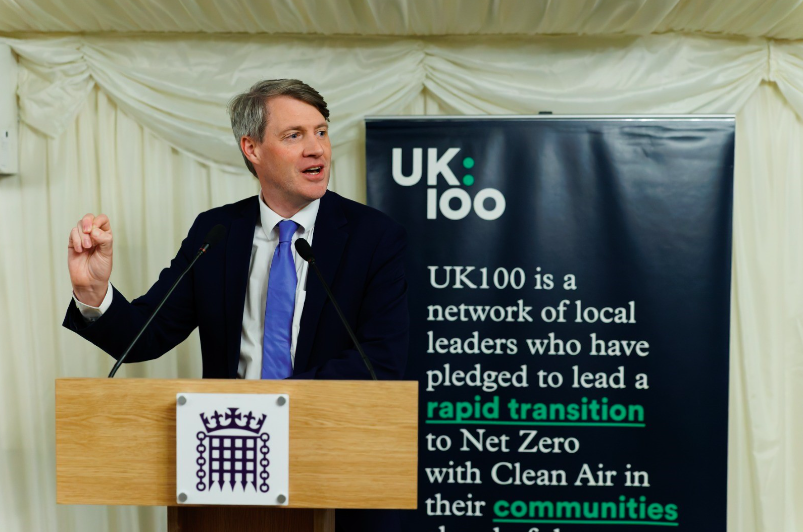
Update for 5 January 2024: This article was originally published by Spotlight in September 2023. Chris Skidmore MP, the former energy minister and government net zero tsar, has now resigned his seat to trigger a by-election, citing his opposition to new oil and gas licenses.
In just one week, the Prime Minister has managed to send a signal on net zero that has undermined Britain’s competitiveness, destabilised business confidence, and betrayed a manifesto promise to the very voters that swept the Conservative Party to power in 2019 on the back of a historic majority.
Rishi Sunak’s decision to row back on key net zero policies risks locking in higher energy bills, costing jobs and leaving the UK trailing behind in the green industrial revolution. But an army of ambitious local leaders are determined not to let that happen.
The recent reversals on electric vehicles, energy efficiency and the rumoured shrinking of HS2 is a slap in the face to the companies and investors who have put their faith in the UK’s ambitious climate strategy. Multinational businesses have invested billions in the roadmap set out by successive Conservative prime ministers: they have just had the rug pulled from under them. And even the most stridently apolitical are speaking out, from Ford to Eon.
These companies and others will now be looking to take their investments and innovations elsewhere. The jobs desperately needed to boost our productivity and manufacturing industries will now go abroad to countries like the US, where the Inflation Reduction Act is turbocharging the green economy. Britain is slowing down while the rest of the world surges ahead to cash in on the green wave.
Blaming the slow-down on the cost-of-living crisis is disingenuous. The Prime Minister has unarguably diagnosed a real problem across the country, but the prescription is based on a serious false economy.
We’ve seen this kind of myopic solution before: the Prime Minister’s announcement had echoes of David Cameron’s volte-face on climate policies in a bid to “cut the green crap”. Cameron’s move, like Sunak’s, was to slash policies aimed at boosting energy efficiency. Britain has some of the draughtiest homes in Europe, but until the axe fell in 2013, it also had a world-class home insulation programme aiming to deliver more comfortable and affordable homes. Insulation rates fell by over 90 per cent as a result of Cameron’s decision, and they have never recovered since. The decision added £1.5bn to families’ energy bills over the last year alone and has kept households hooked on a volatile international gas market. It is one of the reasons the energy crisis hit Britain so hard, with the price of gas skyrocketing when Russia invaded Ukraine. If the gas crisis taught us anything, it’s the need to wean ourselves off an energy source whose price is tied to the whims of brutal totalitarian regimes.
[See also: Sunak’s net zero U-turn breaks with international opinion]
Instead, scrapping common-sense policies ensuring homes for millions of renters are more comfortable and affordable by making landlords responsible for basic energy efficiency upgrades (while also pushing back the phase-out of increasingly expensive-to-run new petrol and diesel cars) will only prolong the UK’s exposure to volatile fossil fuel markets. It will increase costs today and for years to come.
I admire Rishi Sunak’s desire to be honest with the public. That means acknowledging that costs exist, but also that they are dwarfed by the costs of delay and inaction. It means major infrastructure projects being evaluated rationally, not scrapped halfway through construction. According to economists, the cost of delaying action will fall hardest on those least able to pay, and according to scientists, Britain will fail to meet the world-leading targets I was proud to sign into law in 2019.
It also means being honest that net zero is happening with or without the UK government’s support. Clean energy is now cheaper than fossil fuels. Last year, the International Energy Agency reported investment in solar outstripped oil and gas for the first time ever. The transition is accelerating and cannot be stopped.
And that’s just as true locally as it is globally. Today, the Local Mission Zero Network, chaired by the Conservative mayor for Tees Valley, Ben Houchen, and I is launching its new “The Future is Local” report that highlights the vital role local governments are already playing in delivering on the UK’s climate promises.
By working with stakeholders up and down the country, including groups like UK100, the UK’s only cross-party network of local leaders committed to ambitious net zero action, “The Future is Local” highlights how ambitious councils and combined authorities, from Cornwall to Greater Manchester, are already leading the way on net zero at the local level despite barriers put up by Whitehall and Westminster.
If central government isn’t going to step up, it should – at the very least – get out of the way of local leaders and let them lead the charge on progress.
That means consolidated, long-term funding tailored to local areas rather than short-term competitive bidding pots. It means planning reforms are urgently needed so developments cannot be rejected for exceeding national standards on issues like energy efficiency. And it means introducing a Local Net Zero Charter between central and local government, so councils have the powers and incentives to drive progress in collaboration with their communities.
Currently, instead of helping realise this vision, “The Future is Local” finds that local leaders are drowning in Kafkaesque policies and piecemeal funding pots. Local leaders are in desperate need of a life raft. While political pressure is building on the Prime Minister to do the right thing and steady the national net zero ship, he also needs to remember it is local action that is keeping it afloat.
[See also: In austerity Britain, councils have sold off billions in public assets]




